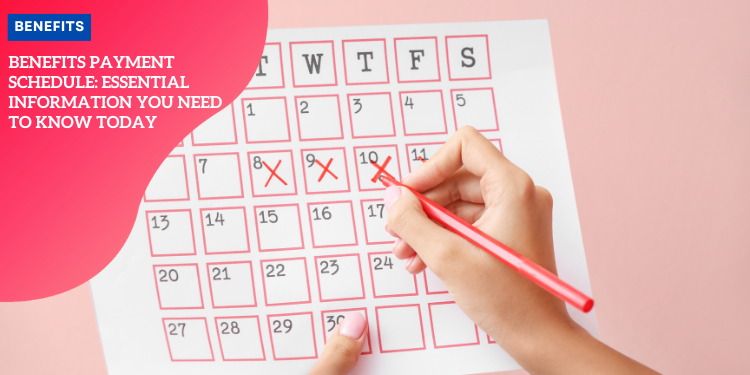Benefits Payment Schedule: Essential Information You Need to Know Today

Understanding Your Benefits Payment Method
When it comes to receiving your benefits, ensuring that you have a straightforward and efficient payment method can greatly contribute to the ease of managing your finances.
For most individuals, direct deposits into bank, building society, or credit union accounts are the standard method.
This means that once your benefits claim has been approved, the funds will be deposited directly into your account without you having to take any additional steps.
This method not only ensures efficiency but also security, as it eliminates the need for physical handling of funds.
Alternative Payment Arrangements
While direct deposits are the norm, there are numerous reasons why some individuals may be unable to manage a traditional account.
Whether it’s due to previous banking issues, a lack of necessary identification documents, or any other barriers, it’s crucial that everyone still has access to their benefits.
In such cases, you should contact the office responsible for your benefits.
They will be able to provide guidance on alternative payment arrangements.
This can include issuing a payment card, similar to a prepaid debit card, or other acceptable means that ensure you receive your benefits without unnecessary barriers.
Accurate Account Details
One of the most essential aspects of the payment process is providing accurate account details when you first submit your claim.
This includes the correct bank account number and sort code, or equivalent details for your building society or credit union account.
Mistakes in these details can lead to delays in receiving your payments and unnecessary complications.
It’s always a good idea to double-check your information before finalizing your claim. If for any reason you need to update your account details, notify the benefits office promptly to avoid payment disruptions.
These considerations around the method of benefit payments are designed to make the process as seamless and accessible as possible.
Be mindful of these points to ensure you receive your benefits without any hitches.
Next, it’s crucial to grasp the timing of benefit payments and how different schedules can affect when you’ll receive your funds.
Payment Schedule and Timing
Managing your finances effectively requires a clear understanding of your benefits payment schedule.
This chapter will help you navigate the regular payment dates, how payments are handled when falling on weekends or bank holidays, and advance payment arrangements for non-working days.
Regular Payment Dates and Their Frequency
Benefits are typically deposited directly into your bank, building society, or credit union account.
The regularity of these payments largely depends on the type of benefit you receive.
For instance, Universal Credit is usually paid monthly, whereas other benefits may follow a different schedule.
Ensuring you know your specific payment frequency is crucial for budgeting and financial planning.
Handling Payments Falling on Weekends or Bank Holidays
Sometimes, your regular payment date might coincide with a weekend or a bank holiday.
In such cases, you do not have to worry about delays.
Payments are generally processed on the last working day before the weekend or holiday.
For instance, if your payment date falls on a Sunday, you will typically receive your benefits on the preceding Friday.
Advance Payment Arrangements for Non-working Days

It’s reassuring to know that the benefits system has provisions for ensuring you’re not left without funds during non-working days.
If a scheduled payment day happens to be on a non-working day (like a bank holiday), the payments are generally made in advance, on the last working day before the holiday.
This arrangement ensures that you have access to your funds when needed and can plan your expenses without any unexpected delays.
Understanding these aspects of your benefits payment schedule can significantly influence your financial stability and peace of mind.
By staying informed, you can ensure that your benefits are received timely, even around weekends and holidays.
Moving forward, we’ll look into special circumstances and support options for those who may find it challenging to manage traditional bank accounts.
Special Circumstances and Support
Options for Those Who Cannot Open or Manage Traditional Bank Accounts
While it’s standard practice to have benefits paid directly into a bank, building society, or credit union account, not everyone can manage this type of account.
If you’re in a situation where opening or managing a traditional bank account is difficult, alternative payment arrangements can be made.
These might include using a payment card that allows withdrawals from ATMs and payments at certain retailers.
These accommodations ensure that you still have easy access to your benefits without the need for a traditional banking account.
To arrange for these alternative payment methods, you should contact the office that handles your benefits
. They can provide you with information on the available options and guide you through the process.
This ensures that you can receive your payments in a manner that suits your personal and financial circumstances.
Contact Procedures for Payment-Related Queries
If you have questions or issues regarding your benefit payments, knowing how to reach the right department is crucial.
For most benefit-related inquiries, the contact information will be included in the official correspondence you receive.
Whether you need assistance with payment schedules, updating account details, or resolving issues with missed payments, don’t hesitate to get in touch with the office supplying your benefits.
When contacting the benefits office, having your National Insurance number handy can facilitate faster service.
It’s also useful to have any relevant documentation or letters that provide details about your benefit payments.
This information will help the representative address your concerns more effectively.
Dedicated Support Channels for Universal Credit Recipients
Universal Credit recipients have access to dedicated support channels designed to provide specific help for issues related to their claims and payments. If you’re receiving Universal Credit and face difficulties, you can call the Universal Credit helpline.
The helpline is staffed with knowledgeable representatives who can assist with a wide range of issues, from updating your circumstances to addressing payment delays.
Universal Credit recipients can benefit greatly from this targeted support, which is tailored to address the unique aspects of the Universal Credit system.
The dedicated channels ensure that queries are resolved in a manner that aligns with the complexities of the Universal Credit program.
Staying informed about the various options and support channels available can make managing your benefits much simpler and more efficient.
Next, we’ll delve into the voluntary benefit repayment process, offering a clear guide on how to return any unwanted payments effectively.
| Step | Description |
|---|---|
| Identify and Prepare | Locate correspondence regarding your benefit payments, including letters, emails, or official notifications. |
| ✉ Write a Formal Letter | Compose a letter stating your intent to return the payment, including payment details, date, amount, and reference numbers. |
| Include National Insurance Number | Ensure your National Insurance number is clearly mentioned in your letter for identification purposes. |
| Prepare the Cheque | Enclose a cheque payable to the respective department, ensuring the amount matches the sum being repaid. |
| Required Documentation | Ensure the formal letter and cheque are correctly prepared to prevent processing delays. |
| Tax Credits & Child Benefit | Contact the relevant department, verify overpayment details, and follow their specific repayment instructions. |
Getting Additional Help
Navigating your benefits payments can be tricky, and sometimes you need a bit of extra help.
Fortunately, there are numerous resources in place to ensure you get the information and support you need.
Contact Information for Benefit-Specific Departments
When you encounter issues related to your benefits, reaching out to the right department is crucial.
Here are some key contacts:
-
✅ Universal Credit: If you’re receiving Universal Credit and have questions or concerns, there’s a dedicated helpline available. Additionally, check your online account for messages and notifications.
-
Jobseeker’s Allowance, Income Support, and Employment and Support Allowance: Contact the respective office directly. The contact details can usually be found on any official communication you have received from them.
-
Tax Credits and Child Benefit: For queries related to tax credits or Child Benefit, directly contact the relevant HM Revenue and Customs (HMRC) team. This is essential, especially if you’re dealing with overpayments.
Accessing Specialized Support Services
Managing benefits can sometimes require specialized assistance.
Here’s how you can access the appropriate support:
-
Debt Advice: If you are struggling with debt, organizations like Citizens Advice, StepChange Debt Charity, and National Debtline offer free guidance and support.
-
Banking Services: For those having trouble opening or managing a traditional bank account, consider basic bank accounts or post office card accounts. Check with your local benefits office for recommendations.
-
Financial Management: Several charities and organizations provide budgeting advice and financial management classes. These resources can help you manage your benefits more effectively.
Resources for Resolving Payment-Related Issues
Understanding the process for managing and resolving payment issues is just as important as knowing where to get help.
Here are a few key resources:
- Official Guides and Assistance: The government provides comprehensive online guides like Gov.uk, which covers a wide range of benefits information. These guides help you understand payment schedules, conditions, and how to handle any discrepancies.
- Community Support: Sometimes it helps to talk to others who are in the same boat. Local community centers and online forums can be great places to exchange advice and experiences.
- Formal Support Channels: If you encounter payment issues, such as not receiving your benefit on time, contact the payment office directly. Always have your National Insurance number, payment details, and any relevant documentation on hand to speed up the resolution process.
Understanding and navigating your benefits payments can be complex, but knowing where to get the right help can make a significant difference.
With the above resources and contacts, you should be well-equipped to address any issues that arise.






